“Patterns of Force”
Written by John Meredyth Lucas
Directed by Vincent McEveety
Season 2, Episode 23
Production episode 60352
Original air date: February 16, 1968
Stardate: unknown
Captain’s log. A Federation historian, John Gill—who instructed Kirk at the Academy—has gone missing. He was observing the planet Ekos, one of two twin planets, the other being Zeon, but nobody’s heard from him for six months. The Enterprise has been sent to find out what has happened to him.
A ship comes from Ekos—which is a surprise, since Zeon is the planet that has space travel, not Ekos. Spock reads that the ship is a robot probe armed with a thermonuclear warhead. Chekov destroys it with phasers, but the bigger concern is that the Ekosians shouldn’t be that far advanced technologically. Kirk orders a higher orbit that would be out of range of the Ekosians’ detection.
Kirk is concerned about how Ekos went from a technologically primitive world full of warring factions to a planet that can launch a thermonuclear missile at a ship in orbit. Kirk and Spock beam down in appropriate clothes, wearing subcutaneous transponders. Kirk orders Scotty to come back into transporter range in three hours and beam them up no matter what.
They arrive to find a Zeon being beaten up by soldiers wearing the insignia of Nazi Germany. They see a propaganda screen that shows that the Ekosians have adopted Nazi tactics and Zeons are to be expelled from Ekos. The last shot is of the Fuhrer: John Gill.
Two different soldiers try to capture Kirk and Spock as “Zeon pigs,” and they’re stopped by karate chops and neck pinches, and both members of the landing party now have their very own Nazi uniforms.
Unfortunately, Spock’s uniform is that of a lieutenant, and a suspicious major orders him to remove his helmet, which reveals his Vulcan heritage.
The pair are taken to a cell and interrogated—while also being whipped. The chairman of the Nazi party, Eneg, arrives to continue the questioning due to the fact that the weapons the landing party were carrying have defied examination by their scientists. Eneg orders the prisoners locked away for an hour before questioning is resumed.
Their cellmate is the same Zeon they saw getting beat up before. His name is Isak, and he explains that Ekosians hate Zeons in order to unite themselves. The Zeons came to Ekos to try to civilize them, bringing them technology and such, but then the Nazi movement started, and they focused all their ire on Zeons. The movement started around the same time Gill arrived.
They need to get out, so they use the crystals in their transponders (which they pull out of their arms by use of a slat in the cot to cut their arms open) to focus the light from the bulb in the cell to make a crude laser that burns off the cell’s lock.
Kirk cries for the guard, and Spock does the neck pinch. Kirk puts on the guard’s uniform and they free Isak as well, as he can show them to the lab. Kirk pretends to be taking two Zeon prisoners to the lab for experiments in order to distract a guard and steal his key to the lab, and they get in and find their communicators disassembled, with no sign of their phasers.
The guard goes back when he realizes his keys are missing, and Isak clubs him on the head. Spock puts on his uniform, and they carry a “dead” Isak out on a pallet. Isak leads them down into the sewers to a cave system where there’s a Zeon underground. Isak is reunited with his brother Abrom, and he learns that the Nazis killed his fiancée.
Spock goes to a quiet area where he can put the communicators back together. He manages to get one finished, when some Nazi soldiers enter, led by Daras, whom they saw in the propaganda film earlier being given a citation. She shoots Abrom—but then Kirk and Spock get the drop on her. Only then does Abrom stand up and reveal that it’s a ruse. Daras is an Ekosian, but she’s on the side of the Zeons. The citation was for betraying her father—which was actually her father’s idea, as he saw the changes in the Fuhrer and wants to fix things, so he set it up so Daras would become a favorite of the regime.
Kirk finally explains who he is—and who John Gill is. Daras is shocked to learn that the Fuhrer is an alien. But it’s impossible to get in to see him. Melakon, the deputy fuhrer, is the only one who sees him, he’s in seclusion otherwise.
The Fuhrer is giving a speech—possibly to declare war on Zeon formally—and only the most important party leaders will be there. Daras will be as well, and they need her to get them in. Kirk hits on the idea of a documentary crew following the new face of the Fatherland around with cameras and lights.
They shoot in the hallway to get a look at the booth from which the Fuhrer will give a speech, and Gill looks completely out of it. Kirk thinks he might be drugged or had a psychotic break. Their three hours are up, so the Enterprise is in range, and they make contact via Spock’s cobbled-together communicator. Kirk orders McCoy beamed down in the uniform of a Gestapo colonel (of course, the Gestapo didn’t actually wear uniforms, but we’ll let that go). At no point does anyone mention the fact that they aren’t wearing their transponders.
The SS has picked up the communication and are searching the building. McCoy beams down and two seconds later, Eneg comes in with troops. They bluff that McCoy is drunk and they’re keeping him in the storage closet so he doesn’t embarrass the Fuhrer. Eneg compliments them for their discretion, and Kirk wonders why Eneg didn’t recognize Kirk and Spock.
The speech begins, and they head to the main room where it’s being broadcast on a television screen. The microphone is blocking Gill’s mouth so you can’t even see his lips move as he gives his speech. In McCoy’s medical opinion, he’s been drugged based on how he looks, and the disjointedness of his speech. Melakon then declares the Fuhrer to be awesome and declares death to Zeon. (Pointedly, Gill’s speech never mentions Zeon once.)
Kirk, Spock, McCoy, Daras, and Isak break into the control room by pretending to film the guards with the hero of the Fatherland and taking them out. McCoy confirms that Gill’s been drugged, but he can’t say what was used. He risks a stimulant.
Melakon has ordered the Ekosians to wipe out the Zeons once and for all, under orders from the Fuhrer he says. There’s now urgency, so Kirk orders Spock to mind-meld with Gill, and he determines that Melakon is the true power of the Nazi party, with Gill as the figurehead. He’s coherent enough to answer direct questions. Gill thought he could unite the Ekosians with the efficiency of Nazi Germany without the sadism. But Melakon took over and reintroduced the sadism, leading to this nightmare.
Eneg and his guards show up, and Kirk orders Spock to take off his helmet. The cover is that Daras has captured a Zeon spy who was trying to assassinate the Fuhrer. They say that the spy should be taken to Melakon, and Eneg agrees—at which point Isak realizes that Eneg is part of the underground as well. Kirk is left alone with Gill while the others go to Melakon.
Kirk risks a further stimulant and urges Gill to give a speech condemning Melakon, which he does, ordering the recall of the fleet that will attack Zeon. Melakon shoots Gill, and then Isak shoots Melakon. Gill dies in Kirk’s arms, his last words are realizing that he was wrong and he should’ve followed the non-interference directive. (Little late there, bucko…)
Eneg and Daras promise to go on the air and continue Gill’s work.
Fascinating. Melakon has a blast performing an evolutionary analysis on Spock, saying that his sinister eyes and malformed ears point to an inferior race, not to mention the low forehead, denoting stupidity, and the dull look of a trapped animal. Leonard Nimoy’s “seriously, dude?” expression during all this is epic.
I’m a doctor not an escalator. McCoy has trouble putting his boots on. That and diagnosing Gill is about all he does this episode.
Hailing frequencies open. It’s unclear why Uhura didn’t pick up the broadcasts on Ekos the way she did back in “Bread and Circuses.” It would’ve saved Kirk and Spock some trouble on the surface…
It’s a Russian invention. Chekov gets to fire the weapons this week, destroying the missile the Ekosians use to attack the Enterprise.
I cannot change the laws of physics! Scotty is ordered to beam the landing party up in three hours no matter what, using the transponders. When three hours pass, no mention is made of the transponders at all.
Channel open. “Captain, I’m beginning to understand why you Earthmen enjoy gambling. No matter how carefully one computes the odds of success, there is still a certain—exhilaration in the risk.”
“Very good, Spock—we may make a human of you yet.”
“I hope not.”
Spock having an epiphany, Kirk insulting him, and Spock refusing delivery of the insult.
Welcome aboard. David Brian plays Gill, while Richard Evans plays Isak, Valora Noland plays Daras, Skip Homeier plays Melakon, Patrick Horgan plays Eneg, William Wintersole plays Abrom, Chuck Courtney plays Davod, Bart LaRue plays the newscaster, and Gilbert Green, Ralph Maurer, Ed McCready, Peter Canon, and Paul Baxley play various Nazis. Homeier will return in “The Way to Eden” as Dr. Sevrin. Maurer previously played Bilar in “The Return of the Archons.” McCready previously played an inmate in “Dagger of the Mind” and the crazed tricycle owner in “Miri” (he’ll be back in “The Omega Glory” and “The Spectre of the Gun”—all his appearances are in episodes directed by Vincent McEveety). LaRue and his awesome voice previously played Trelane’s father in “The Squire of Gothos,” the Guardian in “The City on the Edge of Forever,” the announcer in “Bread and Circuses,” and one of the providers in “The Gamesters of Triskelion.”
Plus, of course, we have recurring regulars James Doohan, Nichelle Nichols, and Walter Koenig.
Trivial matters: This is the only actual writing credit that John Meredyth Lucas has that occurred during his tenure as show-runner. His previous effort, “The Changeling,” was under Gene L. Coon’s regime, and his next two (“Elaan of Troyius” and “That Which Survives”) will be in the third season under Fred Freiberger.
Eneg was named after Gene Roddenberry, in what was probably an affectionate dig.
Gill was referenced in the Enterprise episode “In a Mirror, Darkly, Part 2,” as well as several works of tie-in fiction, among them Federation: The First 150 Years by David A. Goodman, Strangers from the Sky by Margaret Wander Bonanno, and A Less Perfect Union (in Myriad Universes: Infinity’s Prism) by William Leisner.
The various offices of the Ekosian Nazis were actually offices on the Paramount Pictures lot. When the chancellery was seen from the outside, the windows are shuttered because it was an active office building, and people were doing studio business.
This episode wasn’t aired in Germany until 2011.
Spock mentions Lee Kuan as an Earth tyrant who is meant to be from some time between the late 20th and 23rd centuries. He’ll be mentioned again in “Whom Gods Destroy.”
To boldly go. “You should make a very convincing Nazi.” You gotta wonder how William Shatner and Leonard Nimoy, both Jews, felt about this episode. Nimoy, interestingly enough, never quite does the salute right and is half-hearted about it, even though a) he’s supposed to be in disguise as a Nazi officer and b) the character he plays is one nitpicky sonofabitch.
Otherwise—blargle. I have no idea what to say about this episode. I mean, it’s the Space Nazi episode, so it’s hard enough to take it seriously. It’s obviously a budget-saver, since all the costumes were lying around the Paramount lot, and they used the Paramount lot for most of the locations. The script is a mess, as things are mentioned early on and then forgotten, starting with the missile attack at the beginning. Why is there no mention by Melakon or Eneg of the ship they fired on at the top of the episode that destroyed their missile? Shouldn’t there be concern about that?
Kirk and Spock put subcutaneous transponders into their arms, which is a great idea, and one that would’ve proven handy in any number of other episodes. And then it’s used—to make a laser so they can escape their cell? Er, okay.
Gill is so drugged that he can barely talk coherently to Kirk—until it’s time to give the speech condemning Melakon, and then he’s all eloquent and stuff.
Kirk and Spock put on so many different uniforms in this episode, it devolves into absurdity, especially given that by episode’s end there are about a dozen unconscious Nazi soldiers lying around in their underwear….
And then we have the “revelation” that Melakon is the true bad guy here—except until Gill’s canned speech, we haven’t even seen Melakon except for a few seconds on a TV screen pinning a medal on Daras, which makes the revelation significantly less interesting.
But the biggest problem here is that Gill’s plan just doesn’t make any sense on the face of it, because Nazi Germany wasn’t an efficient state (though, to be fair, that notion was a popular one when the episode was written). It was an effective one, though that was as much due to how the victors in World War I stepped on the Germans’ necks with postwar reparations. Hitler’s propaganda was far more effective being given to a beaten-down people. (Hitler’s tremendous charisma was a big part of the Nazis’ success, too, and Gill—especially incoherent drugged Gill—doesn’t have anywhere near the ability to rabble-rouse that the original Fuhrer did.) But it was actually a messy bureaucracy full of departments that didn’t trust each other (leading, among other things, to the blunder of invading Russia in winter, one of the most costly acts of the war from the German perspective).
Warp factor rating: 4
Next week: “The Ultimate Computer”
Keith R.A. DeCandido has bunches of short fiction floating around, including “Back in El Paso My Life Will Be Worthless” in The X-Files: Trust No One, “Streets of Fire” in V-Wars: Night Terrors, “Time Keeps on Slippin'” in Stargate SG-1/Atlantis: Far Horizons, “William Did It” on StoryOfTheMonthClub.com, and “Send in the Clones” in The Side of Good/The Side of Evil, plus the upcoming short fiction “Live and On the Scene” in Nights of the Living Dead, “Right On, Sister!” in Limbus Inc. Volume 3, and “Identity” in Alternate Sherlocks. Plus there’s his short fiction collection Without a License: The Fantastic Worlds of Keith R.A. DeCandido.










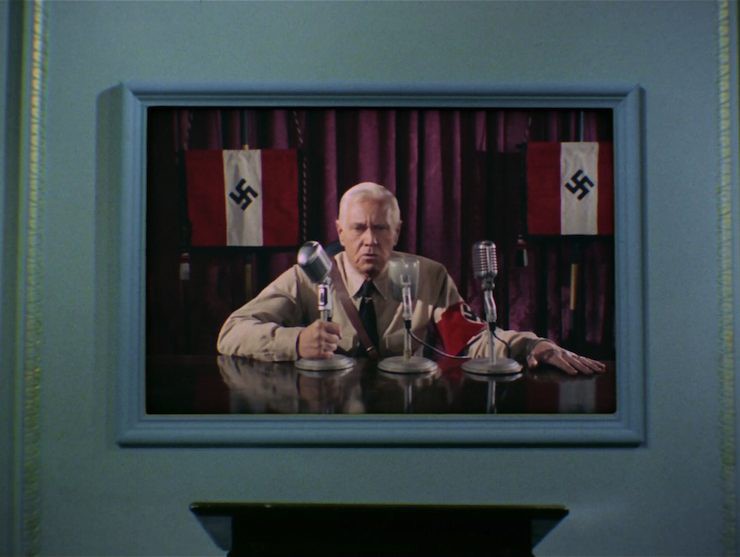
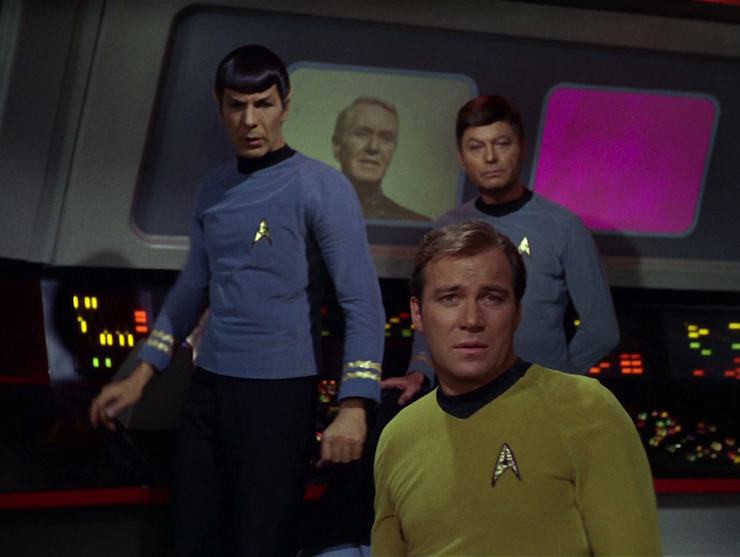
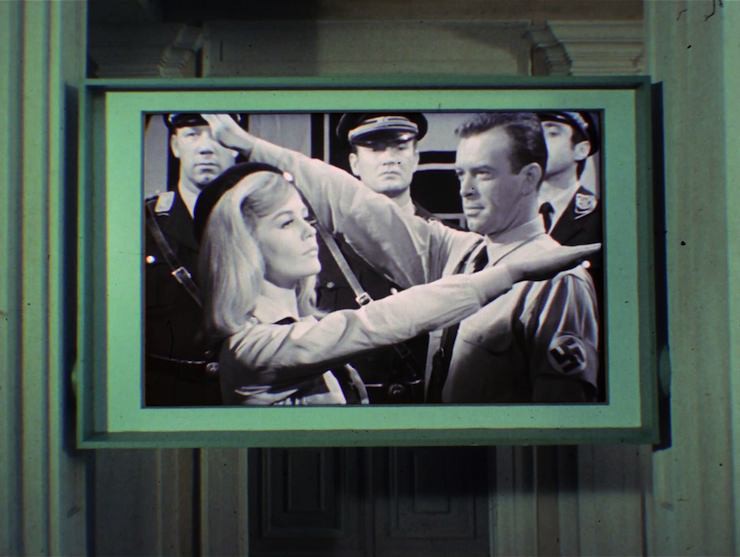
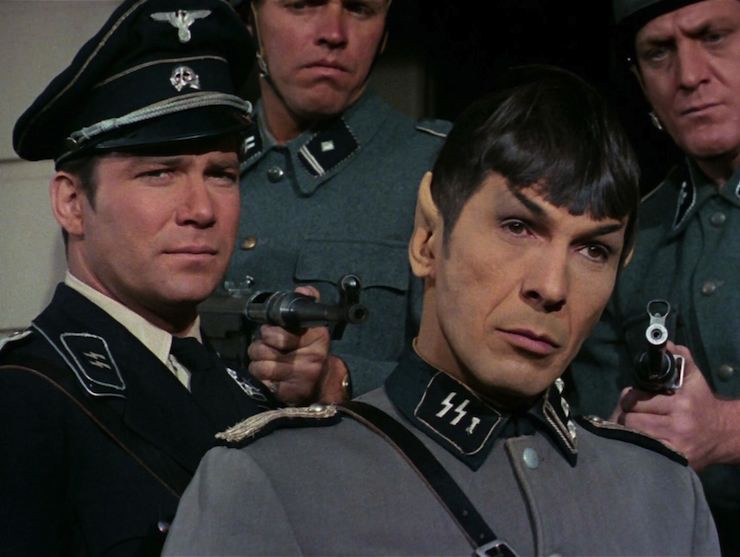
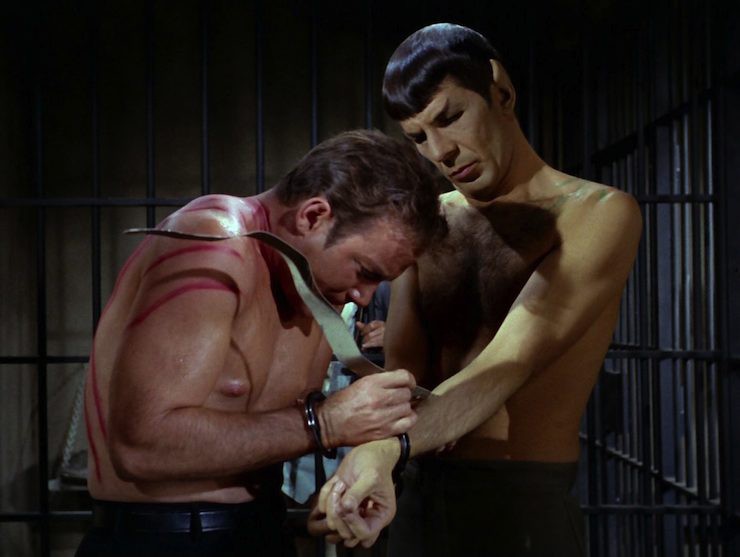
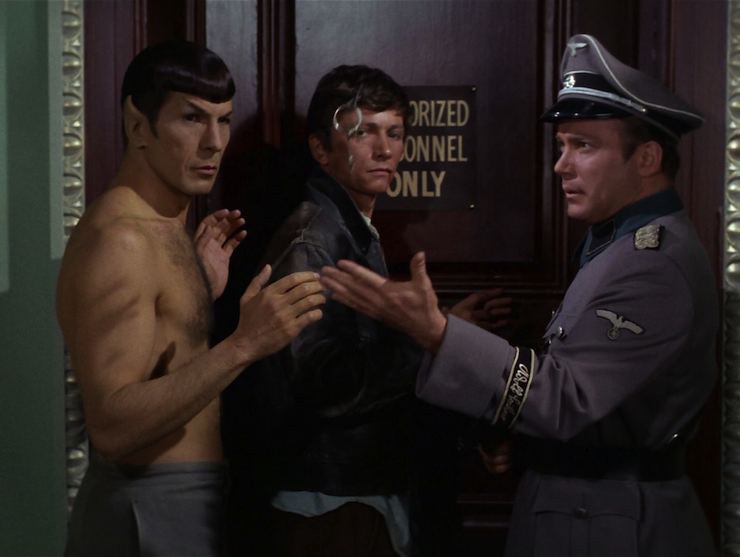
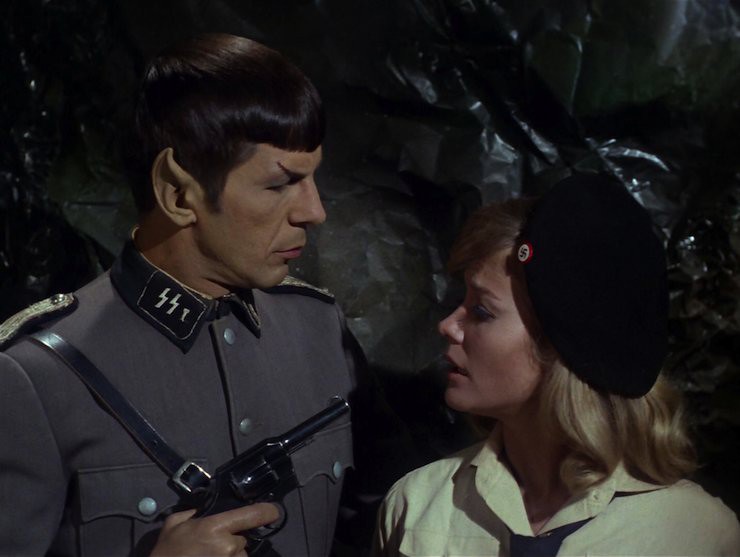
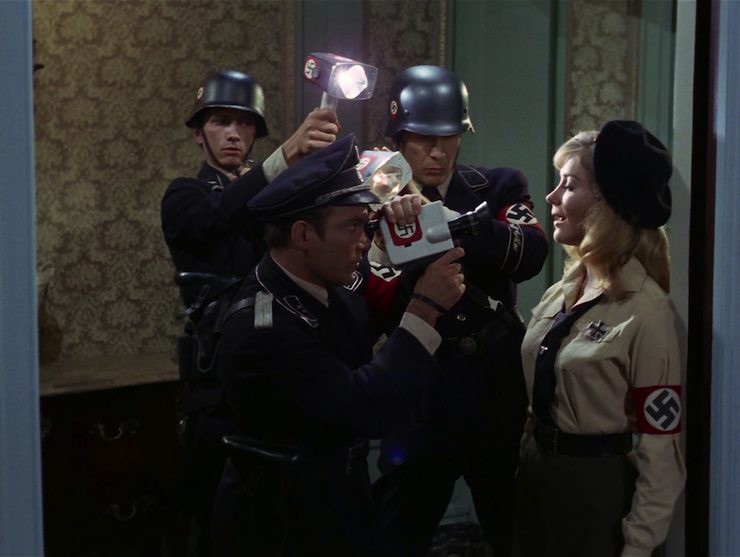
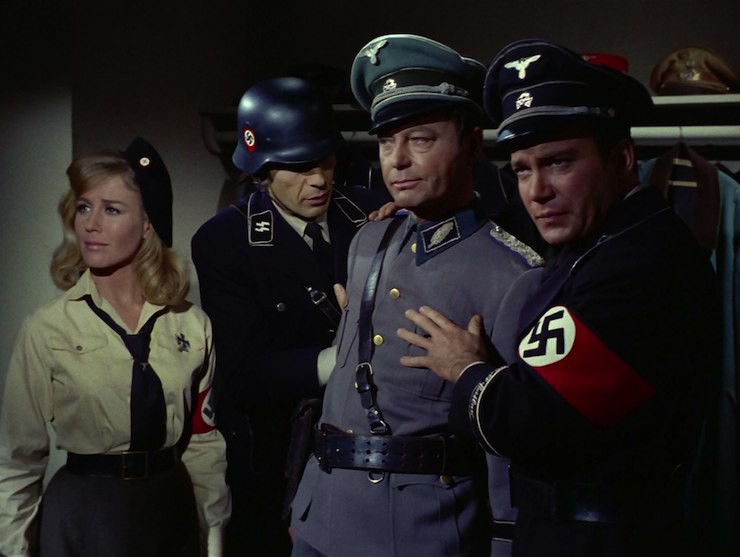
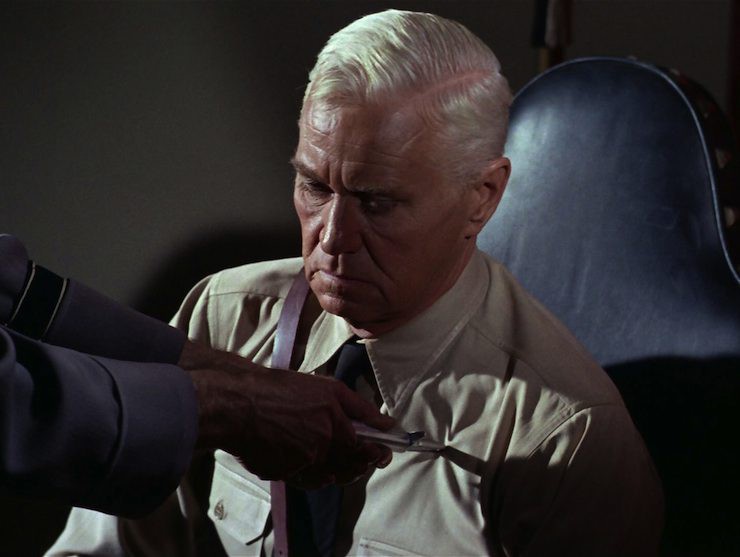
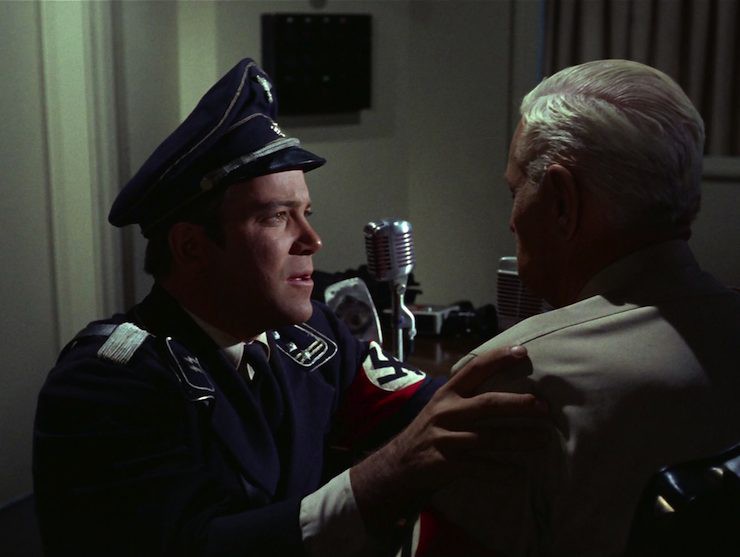
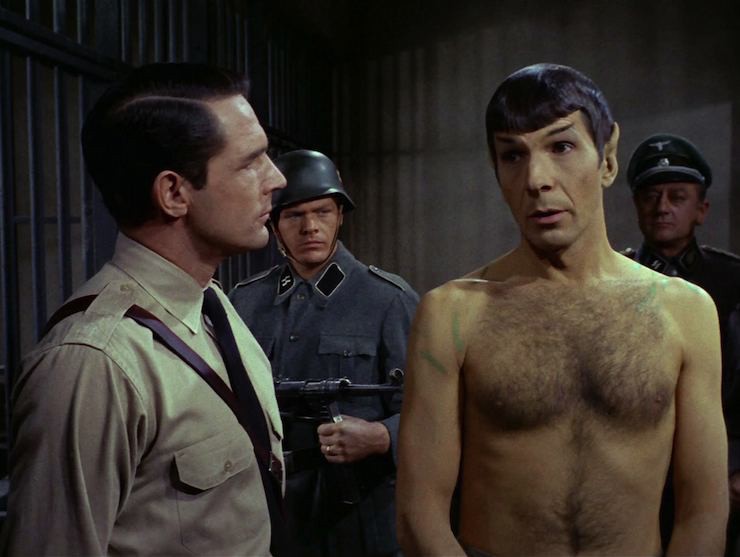
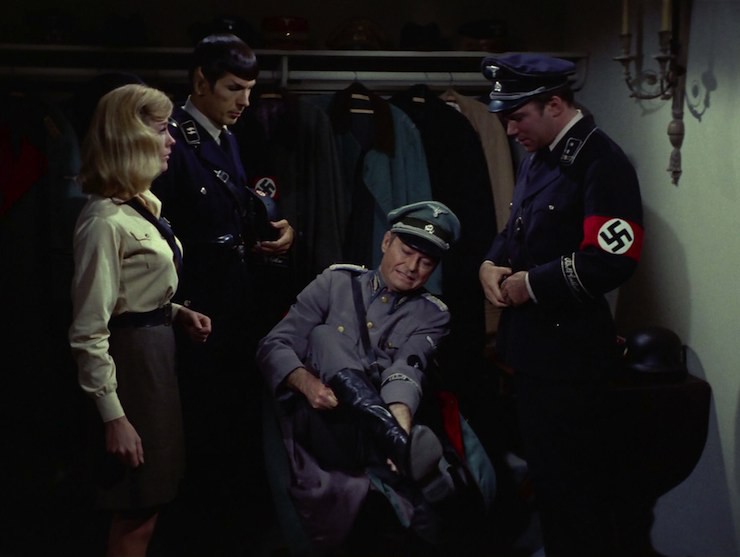
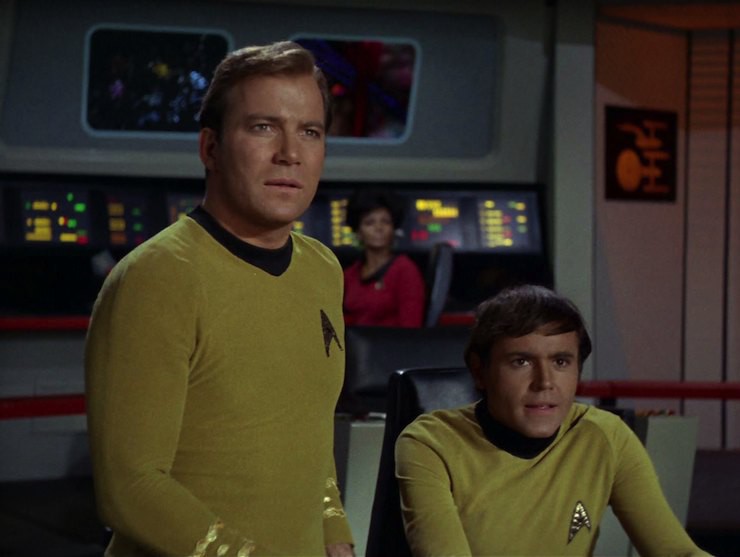
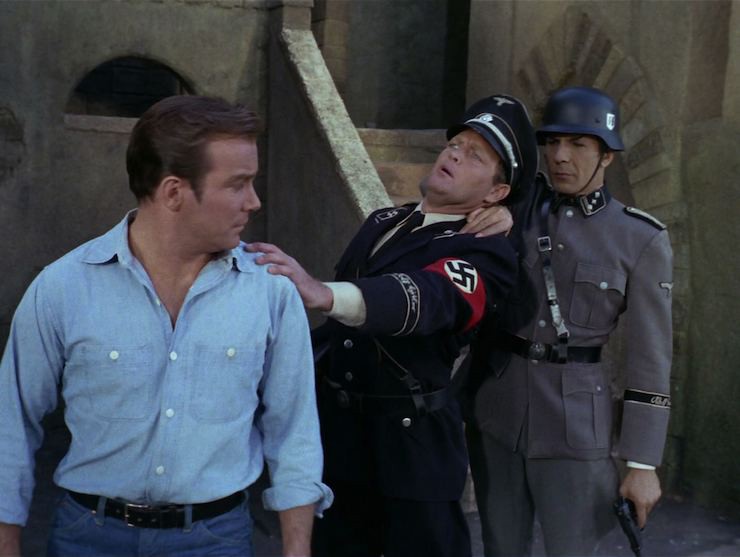
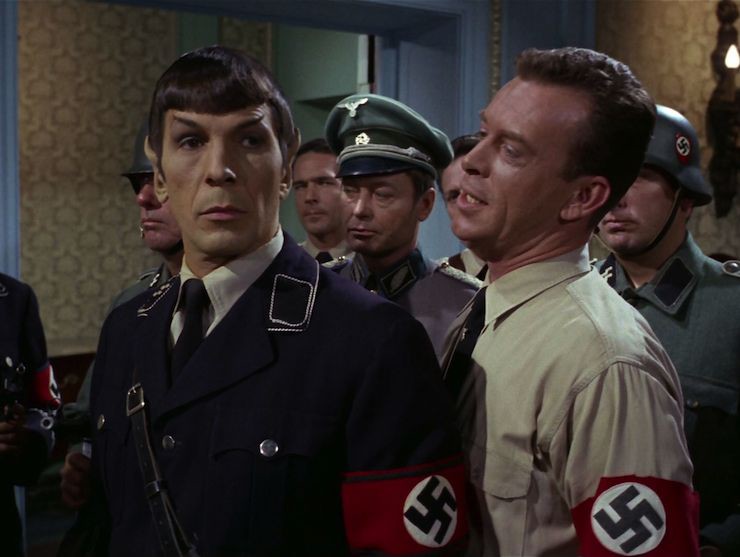
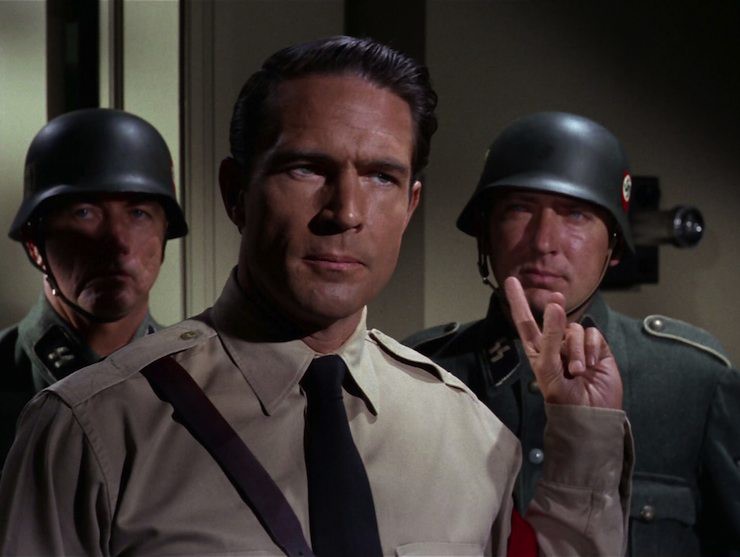
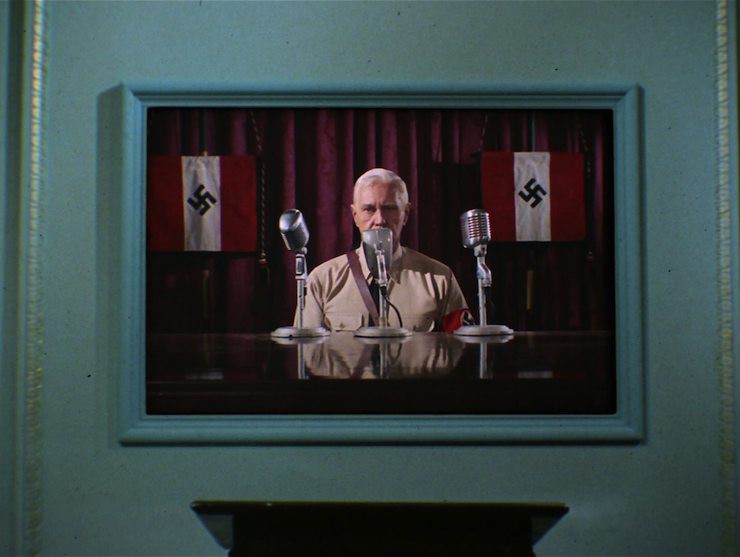
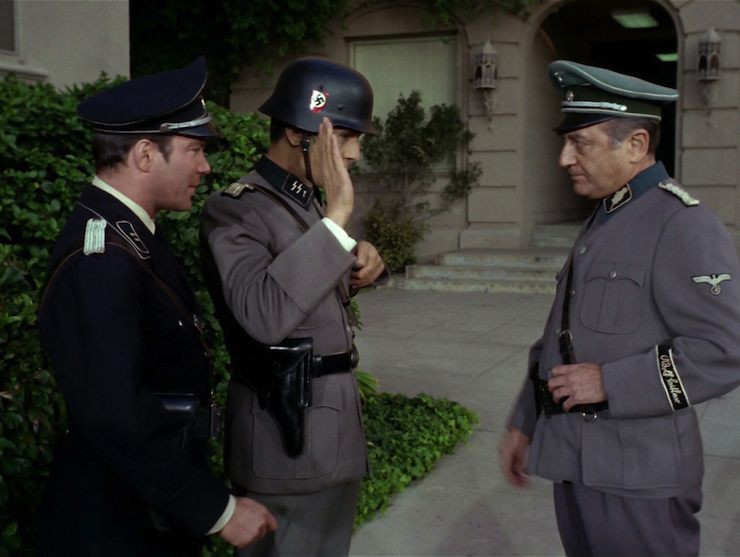
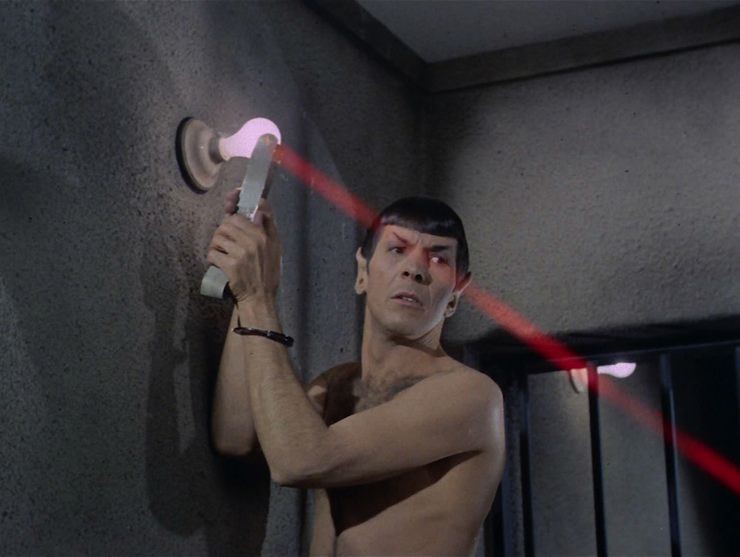
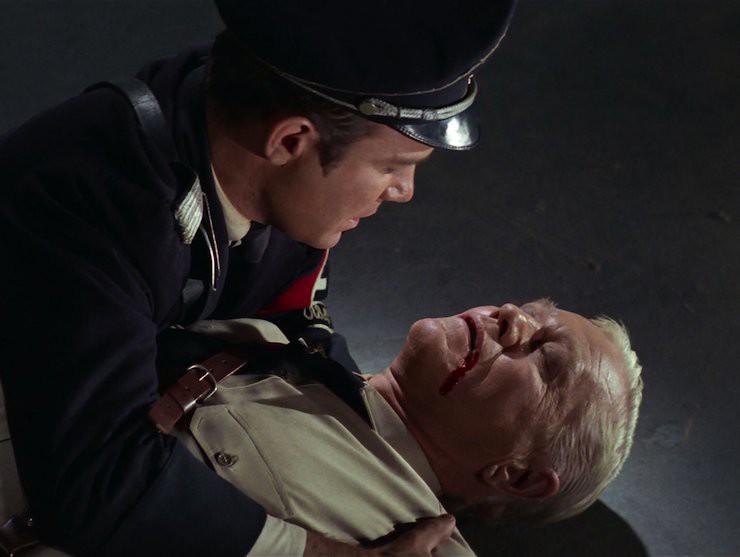
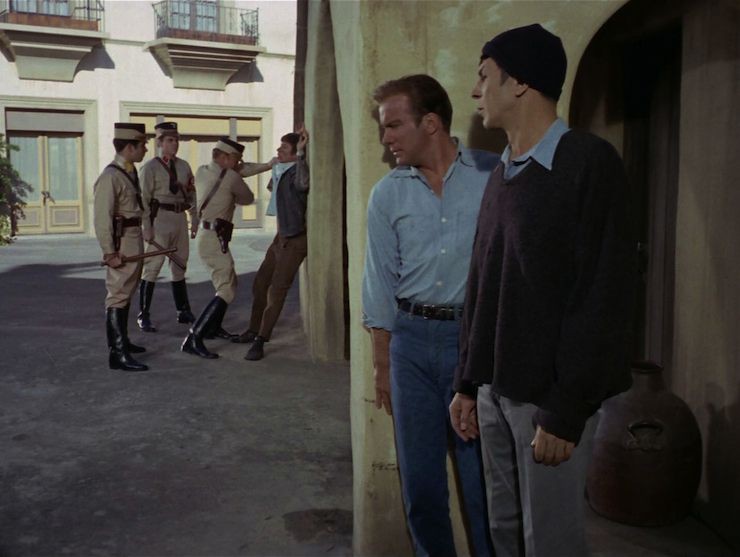

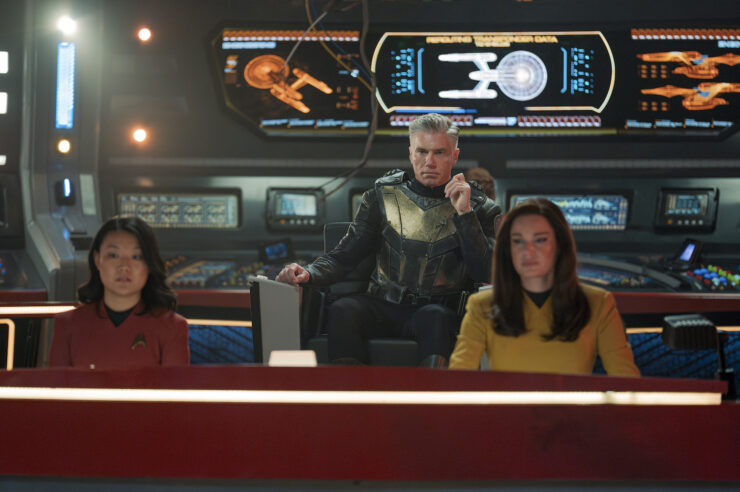
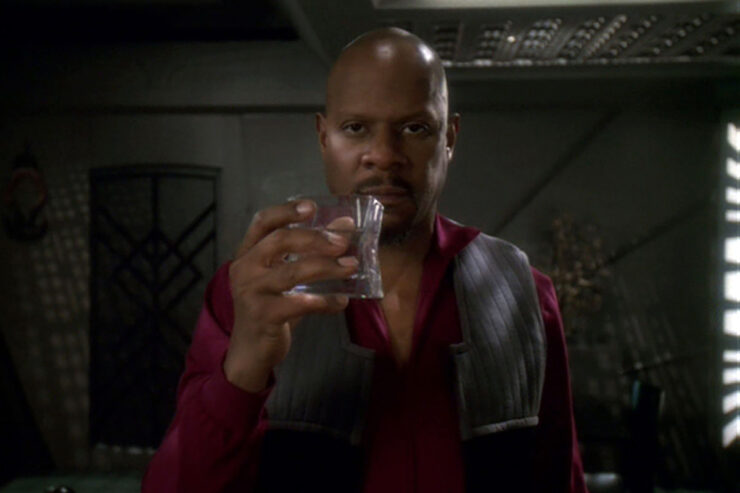
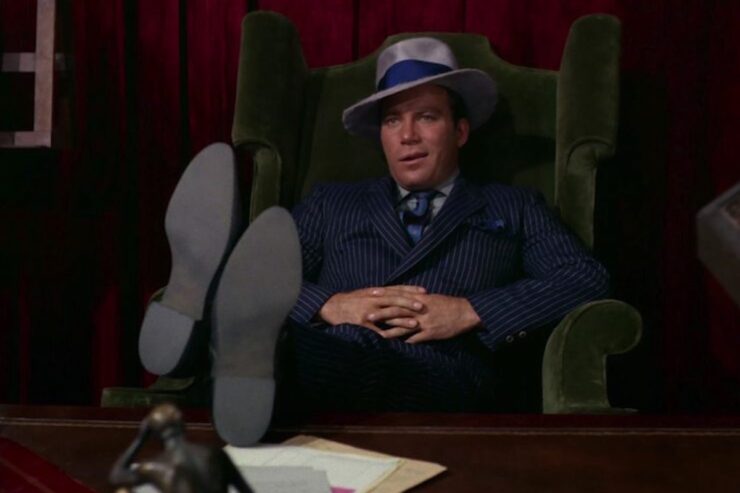
Oh. This episode. I can only assume that there was some sociological context in the 1960s which has been lost to the march of time that made this seem like a good idea (perhaps after a mere 20 years they felt they needed to remind people why the Nazis were a horrible idea in case anyone accidentally elected an ideologue whose racism sounded like a simple solution to a very complex set of problems). Okay. Space Nazis. Whelp, there we are. Space. Nazis.
While it’s technically correct to say that this episode didn’t air in Germany until 2011, that really doesn’t tell the reality of this episode’s history in Germany. The actual broadcast history goes something like this (which I teased out back in 2011):
The episode was never officially banned like some movies and video games (which these days can usually be had anyway, they just aren’t sold over the counter). The rights to the show were originally held by ZDF (one of the two national state-operated channels, but like NPR or PBS, they’re only funded by the state and are otherwise independent). They had the show in the 70s, but only broadcast 39 episodes. One of the first private networks, Sat1, had the rights in the 80s. They dubbed all the episodes ZDF had ignored, but were too hesitant to show this one (We might get letters!). The German SciFi Channel also chickened out in 2008 or 2009. However, once collections started coming to video in the mid-90s, “Patterns of Force” was included along with everything else and has been available ever since. It was also broadcast on pay TV in 2004. On top of that, it was only shown on one of the digital side-channels, ZDF Neo, so the only people who could even watch it were those who have gone over to digital cable or satellite. I have no idea what’s happened in the last 5 years, but I’m not really aware of TOS being shown at all in that time period. But frankly, anybody in Germany who wants to see it should have no problem at all.
ETA: added the last 2 sentences in the previous paragraph.
DemetriosX: I didn’t have the mental RAM to get into the specifics, I just figured I’d mention that. Thanks for the more detailed summary. :)
—Keith R.A. DeCandido
Typo alert: Daras was played by Valora Noland, not Nolas. Although that was a stage name. Her real name was Valor Baum; she was born the day after Pearl Harbor, and her name was inspired by a Winston Churchill speech. So it’s kind of fitting that she’d be playing a Nazi fighter here.
There’s sort of a Mission: Impossible vibe to this episode, not only because of all the disguises and impersonations and improvised escape methods and scheming to overthrow a tyrannical regime, but because M:I also frequently used the Paramount office buildings to represent government facilities in enemy countries, and William Wintersole had notable roles in a few of their episodes.
I never minded this episode much, but it’s a bit off-putting to see a Nazi story that’s basically a comedy. But then, Hogan’s Heroes had been on the air for a few seasons at this point, and The Producers came out a month after this episode, so I guess it was part of the zeitgeist.
Among the many other dubious notions in this episode is how Spock praises Gill as a great historian because he focuses on causes and motivations rather than names and dates. Granted, Spock isn’t a historian, but studying history moves beyond the “names and dates” phase somewhere around 8th grade level. It would be like praising a mathematician for “using clear notation.”
And speaking of historians, only in the rewatch do I realize just how unlucky Ship’s Historian Marla McGivers (from Space Seed) was. By getting condemned to Ceti Alpha Whatever with Khan, she missed out on the Space Nazis, Space Rome, Space Chicago, meeting Leonardo da Vinci, outing Jack the Ripper, and even a Space Greek God! If the whole Khan thing had happened later or not at all, she would presumably have had the most notable Ship’s Historian career in Starfleet history. Tough break…
Actually, the Gestapo did have a uniform. By 1940 they wore SS Gray in occupied territory, and even though they wore civilian clothes inside Germany, there were rules about what they wore, so they also had civilian uniforms.
@5/dunsel: More fame for Lt. Erickson from “Yesteryear,” then!
@7/CLB, We definitely have to give Lt. Erickson his due. What impressed me most was his treatment of Federation history as causes and motivations rather than dates and events. Not like those “other” historians.
Ah, the old “Nazis were efficient” thing… Oh, and Spock’s Hairy Chest is my new band name.
Could it be that the Trek-universe Nazis were more efficient than our universe’s Nazis? After all, it only took Edith Keeler’s peace movement to tip the balance of history in favor of their conquest of the world. And their rocket scientists who went to work for other governments after the war may have been more efficient too, given that Trek’s Earth managed to develop interplanetary sleeper ships by the 1990s and launch six Voyager probes.
CLB, I love that idea if for no other reason than it gives Kirk the improbable tally of no fewer than *four* problems indirectly caused by Nazis (this episode/”City”/Khan/V’Ger).
Yes! Nazi Germany is a model no professional historian would have implemented under any circumstance. Hitler’s belief in social Darwinism deeply influenced his idiosyncratic style of management. He’d give people contradictory instructions in areas where their responsibilities overlapped in order to create needless competition and infighting that would result, he felt, in the eventual fulfillment of his orders by the most qualified subordinate. The main consequence of this was the creation of a chaotic maze of bureaucracy and competing priorities that was so unwieldy that several important scholars of 20th century German history (Hans Mommsen, Sir Ian Kershaw, Martin Broszat) have gone as far as to classify Hitler as a “weak dictator” and the Third Reich as a non-totalitarian state. Mr. DeCandido is dead-on about that and this episode. It’s just not very good or coherent.
Gotta say, when it comes to Space Nazis I think ST: Enterprise did a better job. That story made a little more sense anyhow. And in response to CLB @@.-@, making comedy out of Nazis had been done well before this during WW2. Jack Benny in “To Be or Not to Be,” plus a bunch of Disney and Warner Bros. cartoons, come to mind.
Nazis: “Heil Hitler!”
Hitler: “Heil myself.”
Actually, it seems that comedy Nazis was a norm around the period. In USSR the first time Nazi Germany was shown as something other than bunch of comic stereotypes was in 1973, before that Nazi soldiers and generals were thrown in only as laughing stock. And Danderman makes good point about US cartoons and movies.
As to why nobody mentions the ship they fired at – actually, they do. They report the successful rocket launch and ship destruction, great example of totalitarian state propaganda by the way. And of course Melakon won’t be running around telling everyone about the failure… But they do monitor communications, so some measures are taken.
And of course add me to those who are left wondering – why Nazi Germany? Ok, I get where “dictatorship is a way to unification” comes from. But using Hitler – out of all Earth dictators – as an example? And also believing that if a good person is at the helm this sort of ideology won’t end up in a mess which makes Gill either very naive or I don’t know what.
@13 & 14: Oh, I’m well aware of the tradition of comedy Nazis going all the way back to wartime propaganda cartoons and “Der Fuhrer’s Face.” But it seems to have become less common in recent decades, aside from things like that Internet-meme “Hitler reacts” video from that movie whose name I forget.
And I just can’t help but feel that a Star Trek episode about space Nazis should’ve been a more potent statement about bigotry and tyranny, instead of a semi-comedy romp. Just imagine what Rod Serling would’ve done with a concept like this.
I believe “Downfall” is the movie Christopher is referring to. Can’t wait to respond more on the episode when I’m not on my phone, but wanted to throw that out there.
#15 Oh definitely, Serling could’ve done quite a lot with a concept like this. If memory serves, there were a couple Nazi episodes of The Twilight Zone. I can’t remember who wrote them.
By the way, has Tor ever done a Twilight Zone rewatch? [searching…] Nope. Darn it.
Did this not get shown much in syndication? Because I don’t recall ever seeing it in the 70’s here in DC.
wiredog: It was part of the syndication package. It’s possible that some markets chose not to air it. I know that Channel 11 in New York City did air it in the usual sequence back in the 1970s……
—Keith R.A. DeCandido
It was on WDCA Ch 20 in the DC area and WBFF Ch 45 in Baltimore often enough in the 80’s from what I remember. I don’t have clear memories of the 70’s though.
Another tie-in to this episode is the fan film Prelude to Axanar which is narrated by John Gill (the credits list actor Orion Acaba as voicing the part).
@18, I saw the episode many times growing up on the Miami area stations that I watched.
@12 There have been several good books published over the past few years on the economics of Nazi Germany that demonstrate that the regime was a financial disaster from the beginning. The much vaunted social-welfare (e.g., free vacations for workers, food banks, etc) and infrastructure projects (autobahns, stadiums, etc) were funded through government bonds that the regime had no intention of redeeming. Liquid funds were obtained through mass confiscations of wealth from Jews or political opponents. A European war was inevitable for the regime because of the constant need for more wealth and resources to maintain the regime’s promised standard of living for its population. This meant the occupied territories of Europe being treated as colonies, with vast amounts of food and industrial output shipped to Germany while the local populations starved. At home, the regime’s industrial production had to depend more and more on slave-labor that was only made economical by working the laborers to death and then bringing in more. Nazi Germany was effectively a global Ponzi scheme that was destined to collapse once its demands exceeded what it could steal.
@10/Christopher: Maybe it’s because it’s a military point of view? Half the TOS writers have at least some war and/or combat experience. It occurs to me that in this kind of military mindset, a character could conceivably have a viewpoint in which Nazi Germany could be acknowledged as some twisted model of efficiency.
I never really knew how to rate this episode, because its tone seems to be all over the place. Is it a comedy? A tragedy? Maybe it’s both. It’s not a bad episode, despite some severe plot holes. I do like it that we get to see Spock’s green blood for once.
But I can see how Gill would suffer from severe tunnel-vision. Given the rise of the First Order on Force Awakens, I have no doubts that there are people on this planet that we live in, who are perfectly capable of viewing Nazi Germany as a good model for society, just like there are people back where I live who would gladly support the return of a military rule, in the name of weeding out corruption and bringing forth order. And that scares me.
I’ve always liked the overt nod to the Jews with the Zeon naming. Abrom, Isak & Davod and even Zeon itself.
I’ve been wondering for a while why this episode bothers me whereas the Indiana Jones films don’t. I think the reason is that Indiana Jones Nazis are really just standard adventure-story baddies who happen to wear uniforms and speak a little German. This episode, in contrast, deals with serious racial persecution, but it does so in a very frivolous manner, and that’s a bit off-putting. The same applies, to a lesser extent, to the fun torture of Kirk and Spock.
I like Isak and Daras, but I would have preferred to see them in a more serious story.
All I can say is that this episode and its prolonged shirtless Spock played a very large part in my adult awakenings. Green stripey-wounds and all.
@23 – Eduardo: As you say, there are plenty of people in the world who think military intervention is a good answer to corruption. On your country, and in mine, I’ve seen plenty of examples. Just know that most of your neighbors from Uruguay support Brazil’s democracy, whatever its flaws.
@26 – LadyBelaine: I’m sure it would have had the same effect on me if I liked guys.
@RussellH //Nazi Germany was effectively a global Ponzi scheme that was destined to collapse once its demands exceeded what it could steal.// I’ve never heard it explained so well before. A regime that spent large sums of money developing and implementing programs of genocide that removed millions of people from its economy was thankfully not long for this world.
@25/Jana: That explains it nicely. It actually does touch on the racism and atrocities, so its handling of them seems superficial. Hogan’s Heroes could get away with it because Klink and Schultz were regular-Army personnel who were running a basically humane POW camp for fellow soldiers. They weren’t members of the Nazi Party and weren’t personally complicit in the gas chambers and the medical experimentation and the like. And they generally had a low opinion of the more hardcore Nazis and SS officers and the like, who were portrayed as rather more villainous.
Granted, “Patterns of Force” hardly asked us to see bigots like Melakon as warm and cuddly, but the humorous treatment did undermine the seriousness of the threat he posed.
That’s the question I’ve always had about this episode, particularly given when it was filmed. My mother had her bat mitzvah the year this episode aired, and she’s talked a lot about how at the time, the Holocaust simply wasn’t talked about in the Jewish community. Growing up, she just accepted as normal that a lot of her friends had no extended family, or that some people at shul had little black numbers on them, and you weren’t supposed to ask about it. It was too raw, too recent.
It really makes me wonder what was going through Leonard Nimoy’s head filming that “evolutionary analysis” scene, especially since his parents were immigrants who came from Ukraine to the U.S. after their wedding–had they not come to America when they did, Nimoy could easily have been a victim of the Nazis himself. (And the “you would make a convincing Nazi” line to Shatner…oof. I don’t know whether it bothered him, but as a blonde Jew myself–one who was regularly pointed to by my Hebrew School teachers as an example of “what the ideal Nazi was supposed to look like,” with absolutely no regard for how uncomfortable it was to be singled out that way–I cringe at that line every time.)
Your teachers were douches.
@31 and @30 – It was the era. My parents were both Holocaust survivors, as were many of their friends, and I was frequently praised in my youth for being a blue-eyed blonde Jew, all the better to blend in with the Aryans. I was even taught how to swear properly (in various languages) so people would assume I was Christian. When I joined a Catholic choir in high school and learned catechism, it was considered totally appropriate cover. However, when my best friend in 9th grade gave me a necklace with a six-pointed star on it, I was forbidden to wear it.
As an adult, I take my Judaism seriously and my children are proud to be Jewish. But when my husband and I moved to rural America, the first thing we did was buy an American flag and some Christmas lights… just in case.
So, why a rating of 4? Kieth had nothing but mirth to say on this episode (most of which I agree with), and then he gives it a 4?!
Yes, I know, “the rating is the least important part of the rewatch”. But still, it makes no ****ing sense.
As for me, I find this episode offensive. I suppose it would have been more bearable if the plot made sense, but as Kieth said in his review: The plot is a complete mess.
The only thing I liked was the McGuyver-style escape using the makeshift laser. That scene is the only reason I’m giving this episode a “1”, and I still think that’s being generous.
Using the transponders to make a laser is a fun concept, but your energy source is at most a hundred watt bulb and you are only capturing a fraction of that power. That it world burn through a jail lock in any useful amount of time (if at all) is stretching the science to the breaking point.
Hogan’s Heroes Klink and Schultz were Luftwaffe, not Army, for a little pedantry.
@35/Crusader75: Maybe that’s why the transponders were made of imaginary “rubindium” crystals — so that they could have arbitrary properties that would make them work better as a laser. Hmm, I wonder… tie-in books tend to assume that rubindium is an as-yet-undiscovered element 120, but what if it’s actually a hybrid of ruby and indium, an element often used in semiconductors? Maybe the semiconducting property enhances the energy concentration/stimulated emission somehow.
Thanks for your sharing ,it is a great help for me to understand this film more .
@31 and @32 — Exactly. My mother to this day is uncomfortable with how public I am about my Judaism, and admits that she used to occasionally look at me as a child and think, “if things go wrong, I’ll be able to hide her.” The psychic scars of the Holocaust in the Jewish community (even among people born decades after the Holocaust) run a lot deeper than people realize.
Though yes, my teachers were also douches.
Yes, I understand the psychic scars left in the Jewish community by the Holocaust; as I have friends who are Jewish and there is a sizable and vocal Jewish community in my country. But yes, your teachers were douches. No teacher should do something like that, whatever the context.
Ah, the joys of being a German Star Trek fan. Germans are the largest ethnic group in the USA and they form quite an important part of the international fanbase. But you never get any character with a German name and then there are the space Nazi episodes.
Torie and Eugene in their previous review round had the warp core breach rating which seems very fitting for this episode which also pretty well explains why John Meredyth Lucas would not have been a good show runner. Honestly without a famous daddy and mummy he probably never would have gotten a job in show biz.
Jana very much nails the problem of the episode which is the tasteless mix of sitcom and shoah. Everything is so bad and embarassing, there’s little wonder that this never made it properly to German TV screens. And there’s the most annoying soundtrack ever with a march droning on endlessly.
My “favorite” dialogue moment is Spock’s spectacularily stupid statement at the end that the planet would make a fine addition to the federation now that Melakon is killed. Honestly how stupid was Lucas? Did he really think if the bad guy is killed then everything is dandy? Often reducing a planet and a society to a handful of people and a single settlement is a problem in Star Trek, but Lucas is completely unable to say anything about fascism if he avoids any description of the society which has borne or at least accepted it.
This would be the most stupid Star Trek episode ever if not for the thrilling idea in later series to misunderstand the respect towards other cultures into a twisted version of eugenics called Prime Directive. Episodes like Homeward, Pen Pals and Dear Doctor are so insanely stupid, they unwittingly reach the intellectual level of The Eternal Jew or Jew Suss.
@40/Lubitsch: Jaeger from “The Squire of Gothos” doesn’t count as a German name?
And who are John Meredyth Lucas’s famous parents?
@40/Lubitsch:
“[…] if not for the thrilling idea in later series to misunderstand the respect towards other cultures into a twisted version of eugenics called Prime Directive.”
Oh yes. Dear Doctor made me so angry I almost stopped watching Enterprise.
“But you never get any character with a German name […]”.
That’s true for any nationality that isn’t part of the English-speaking world. There aren’t a great many characters with French or Polish names either, or characters that could be Chinese, or Arabian, or Igbo.
Besides, as Christopher already mentioned, there’s Jaeger. And a few others might be German, given their name and their looks. Mark Piper, for example. Dehner could also be a German name, though Elizabeth isn’t. Then there’s Lang in Arena and Schmitter in The Devil in the Dark. Appel from the same episode could also be German, if we assume he had some darker-skinned ancestor.
@41 https://en.wikipedia.org/wiki/Bess_Meredyth and https://en.wikipedia.org/wiki/Michael_Curtiz This doubtlessly opened some doors for him.
@41 and 42 Since it’s my own name, surely I remember Jaeger :-). Though he was also alluded to by Trelane with a march and talk about soldiers (whatever the writers intention may have been).
But over the course of five series it’s an incredibly small amount of references if we drop the Third Reich ones. Considering the relative importance of Germany in the development of space exploration (which neither the Polish nor the Igbo quite match) and as already mentioned the large part of US Americans with German descent, I find it disappointing. Especially with no member of the principal cast ever having a German name. We have Scots, Irish, British, Japanese, Russians, French, Arabs (Bashir?) and everything the USA has to offer regarding ethnic background with this one glaring exception.
@43/Lubitsch: Hmm, that’s not how it appears to me. The way I see it, far too many characters have English names. If the writers think of the rest of the world at all, they gravitate towards Spanish, French or somehow Celtic characters. Asians are either Indian or Japanese. No Chinese I can think of off the top of my head, and that’s totally implausible given the size of the Chinese population. (And they are becoming more important in space exploration too.)
@43/Lubitsch: Holy cow, Lucas was the son of the director of Casablanca? That’s amazing! With genes like that, you’d think he would’ve been a more impressive creator.
And Jana’s right. Germans are far from the only nationality overlooked in Trek. There are more people living in China alone than in Europe and North America combined, so where are all the Chinese people in Trek’s future? (Although in my TNG novels, I introduced a human-Vulcan character named T’Ryssa Chen, there’s a Dr. Therese Liao in my Rise of the Federation novels, and the Vanguard series by David Mack, Dayton Ward, and Kevin Dilmore had Lt. Ming Xiong and Captain Zhao Sheng. Many of us novelists have tried to introduce a wider range of ethnicities than the show managed, as well as a wider range of sexualities.)
CLB, maybe that’s an argument for nature over nurture, since Lucas was the son of Bess Meredyth from her previous marriage.
@@@@@ 44 and 45 No doubt about the Chinese though it’s a mix of different criteria a series creator has to consider. There’s the USA with its specific racial diversity and the equally diverse audience as the main target which has to be reflected in a way that the viewers feel comfortable. Then there’s the international public where Star Trek has a different success in different countries. And finally there’s the plausibility of the fictional universe where you could argue that a Chinese character is essential (and an Indian as well) from the point of view of the size of population, but you could also say that USA and Europe are stable major powers throughout the last centuries, while China wasn’t and with its fragile party dictatorship just as well may fall apart.
So there are many factors at play here and with a series like Star Trek showing an utopian earth future as a show runner one is probably guaranteed to offend someone. It’s just that I don’t get that the absence of german names, you could just make them German-American. Considering the 50 million US Americans from German descent and all the corresponding showbiz people with German ancestors from Sandra Bullock to Leonardo DiCaprio it’s not really that much of a stretch.
Instead we get space Nazis … please dear creators of the new series, DON’T. It didn’t work on TOS, on Voyager and on Enterprise. Nazis are not an appropriate choice for stupid espionage hijinks. Do something allegoric a la Duet if you must, but the resisit the temptation of having swastika banners and stylish SS uniforms. Not to mention the Prime Directive as a justification for mass murder. Trekkies can really be happy that there’s no closer attention paid to these episodes.
@@@@@45 Curtiz adopted Lucas to be exact, but you shouldn’t underestimate his mother Bess Meredyth, she was screenwriting royalty of silent Hollywood and Curtiz relied on her advice throughout his career having no writing talent himself. Cushman recounts in his book on page 176ff that Lucas got his assignments though Curtiz’ connections which is at least partly corroborated by direct quotes from Lucas himself.
@47/Lubitsch:”There’s the USA with its specific racial diversity and the equally diverse audience as the main target which has to be reflected in a way that the viewers feel comfortable.”
First of all, that sounds disturbingly like “You should pander to the audience’s racism.” If TOS had settled for what was considered “comfortable,” there would’ve been no Sulu and Uhura. Instead, they challenged conventional racial expectations to reflect the racial reality of the American population. And that’s the issue here. The American population is even more ethnically diverse now than it was then. Asian-Americans are one of the fastest-growing demographics in the country. So Star Trek‘s cast is far less diverse than the American audience — and absurdly less diverse than the global population it’s supposed to depict.
“but you could also say that USA and Europe are stable major powers throughout the last centuries, while China wasn’t and with its fragile party dictatorship just as well may fall apart.”
Which is deeply, deeply shortsighted. For most of the past 2-3000 years, China has been the single most advanced and powerful civilization on the entire planet. The dominance of the West is a short-term aberration on that scale, and there’s no objective reason to expect it to continue. And Chinese civilization has remained dominant even as individual regimes have come and gone. The current dictatorship is really just the latest iteration of that millennia-old cycle; it may purport to be based in Marxism, but it’s at least as deeply rooted in China’s own traditions and heritage (which is why China and the USSR hated each other — because Mao was determined to create a uniquely Chinese-nationalist form of communism, which was heretical to the Marxist-Leninist doctrines of the USSR). Chinese civilization will endure long after the Communist Party of China is a memory — just as German civilization endured after the Holy Roman Empire or the Nazi Party ceased to exist.
“It’s just that I don’t get that the absence of german names, you could just make them German-American.”
As Jana points out, there are dozens of other nationalities that you could say the same thing about. Don’t get me wrong, I’m from a city with a proud German-American tradition (except during the world wars, when we changed a lot of the German place names to more Anglo-Saxon ones), so I know the role Germans have played in the American story. But Star Trek is supposed to be showing a global population, not an American one, and it does a pretty unbalanced job of doing either one.
I’m not sure about pandering to an audience’s racism. Obviously with the USA it’s more complicated because every non WASP can be either an US representative of an ethnic group or truly somebody from a foreign country. I think we never learned where Sulu and Bashir are from, did we?
Generally I think the five series did a reasonably good job of spreading its cast across ethnic groups. TOS is obvious, TNG is ok with a French captain and some black actors, DS9 obviously doing well with Sisko as well as all the aliens, Voyager and Enterprise are ok though here the problem of the “mediocre ethnic actor who can’t act but is here for the diversity quota” creeps in.
As I said Star Trek has per definitionem to fulfill LOTS of quotas: women, ethnic groups and nationalities plus aliens. It’s quite difficult to balance all these demands with a principal cast of seven actors.
As for China, I’m fully aware of its important role earlier on, but I’m not sure if these earlier milennia are that relevant. You could say the same about Mesopotamia, Egypt and Rome who were major players for many hundreds or even thousands of years but declined towards a more modest role today. The crucial era is from the industrialization onwards with its rapidly faster beat of developments in society and technology compared to the rather leisure speed of earlier times. And regarding this the West clearly rules due to the strength of its open societies which encourage consensual solutions and progress. I wouldn’t be surprised if a few hundred years on from now USA and Europe are still dominant.
What might be interesting to discuss in regard with Patterns of Force is the concept of a strong man to unify a society that has essentially fallen apart. Obviously taking Hitler as a role model is very wrong for many reasons mentioned here, but is Gill’s idea of having a dictator to unify the people and break the power of local leaders sound? Always assuming he later wanted to progress towards democracy.
@49/Lubitsch: “San Francisco. I was born there.” — Sulu, The Voyage Home. As for Bashir, he’s pretty obviously English.
And if you think “A bunch of white people with a couple of token minorities” is a good job of representing the diversity of the entire human species, you are sadly misinformed. Again: There are more people living in China alone than there are in all of Europe and North America combined. Humanity is currently about half Asian (East, South, etc.), 1/6 non-Hispanic white, 1/6 black, and 1/6 everything else. Within 50 years, though, it’ll be more like 1/4 black and 1/8 or less non-Hispanic white. Globally, white people are the minority, and we’ll be much more of one by mid-century. If a series purports to show a globally united population from centuries in the future, but the majority of its characters are white with Anglo-Saxon or Irish names, then it’s not doing a very good job.
(This was actually one thing the recent Minority Report TV series did well. The movie had featured an almost entirely white cast — even though it was set in a future Washington, DC, a city that even today has a nonwhite majority — but the TV sequel’s main cast was pretty much entirely nonwhite except for the returning movie characters. The Expanse also seems to cast mostly nonwhite actors in its Earth-based portions, although the Belter characters seem disproportionately white.)
And it’s not “quotas.” It’s simply acknowledging that white people are not the default setting of humanity.
As for the rest, I’ll just say that you’re making the common mistake of seeing history on the scale of mere centuries rather than millennia. In terms of the big picture, it’s way, way too early to assume that the status quo of the past century or two is destined to last indefinitely. No society is intrinsicaly superior or immune to change. Open societies can become closed. Dynamic societies can stagnate. And vice-versa. Half a millennium ago, the most open, inclusive, tolerant, diverse society in the world was the Islamic Middle East, while Europe was poor, backward, and torn apart by holy wars and oppression waged by religious fanatics. Now, it’s the other way around. So it’s naive to assume that the current status quo won’t become completely different again in 500 or 1000 years.
@50/ChristopherLBennett
To be honest, it doesn’t make him American. Is there even a concept of coutries in 23d century, with one president, united goverment and all? It seems to me it is a future where globalization happened and what was separate countries is now only a way to define place, and a historical term, of course.
Actually TOS does rather ok in going beyond tocken representation, mostly by adding random crewmen who represent diversity – there were some black people, if I’m not mistaken in 3rd season we have an obviously indian person just sitting at the station doing some work, and it creates impression that it’s something commonplace. Then there are surnames like Jaeger or DeSalle that may represent etnicity. Or maybe, if I’m right about globalization, the term ethnicity is a bit outdated in 23rd century as well.
And it makes it even more strange strange that there is not even mention of Chinese names (at list none I can think of?). No names, no ship-names, nothing. Especially with China’s population and the country having it’s own space program and obviously bound to contribute to creation of starfleet. I can’t even think of a good enough in-verse explanation.
@51/Darr: Yes, we know there is a concept of countries. Chekov’s ardent Russian nationalism alone makes that clear. Just because they’re divisions of a world government, that doesn’t mean the whole world has become homogeneous. I mean, Americans still have their own state or regional identities, like being a New Yorker or a Texan or an Angeleno. People in Great Britain still identify as English or Scottish or Welsh. Presumably Trek’s United Earth is the same kind of union of diverse parts.
I can think of at least one Chinese ship name in canon — the USS Tian An Men from TNG: “Redemption” and a couple of DS9 episodes. Picard gave Lutan a Sung Dynasty carving as a gift in “Code of Honor,” and Riker quoted Sun Tzu a lot in “The Last Outpost.” There have been references to Chinese culture and to China as a historical entity (including a rather ethnocentric mention in “Contagion” of China being considered a myth until Marco Polo found it — you could equally well say that Europe was considered a myth until Marco Polo arrived in the Khan’s court, although Chinese historians question whether Marco Polo ever existed). It’s the actual people, characters of Chinese descent, that are lacking.
@51: The only in-universe explanation that might explain the otherwise astonishing lack of Chinese and Indian characters, is if Asia suffered absolutely catastrophic damage during Earth’s late 20th and early 21st century wars. A large portion of the Eugenics Wars would certainly have been fought in Asia (since at least Khan’s empire was based there), and it appears that World War 3 (which killed 600 million people) was fought against someone called the Eastern Coalition (which probably included China.) If Asia suffered the brunt of the casualties from both of those wars (and from the Post-Atomic Horrors that followed World War 3) then the Chinese and Indian populations would be greatly reduced and a much smaller share of the total Earth population than they are in the present day.
It’s also possible that after suffering through such devastating conflicts, China and India might have largely become very pacifistic, anti-military societies, which would likely result in less of their citizens joining Starfleet. (Yes, Starfleet isn’t quite a military, but it’s the closest thing the Federation has to a military.) We know the Federation still maintains its restrictions on genetic engineering even 4 centuries after the Eugenics Wars, so obviously the historical memory of those conflicts is still affecting present era Earth, and it would make sense that the nations that suffered the worst from the worst wars in human history might come out of them with a lasting strongly pacifistic culture.
@53/bguy: Such drastic explanations may be unnecessary. In China’s case, historically, they haven’t been big explorers because they already had more wealth, resources, prosperity, and power than anyone around them, so they were generally content to let others come to them. So there’s precedent in Chinese history for them to be an inward-oriented society.
However, that’s history. There are quite a lot of Chinese-Americans these days and the number is growing. Whatever might become of Chinese culture in the future, that wouldn’t account for the absence of Chinese-Americans and people of Chinese descent in other cultures. Even if the country of China were wiped out, there’d still be a large number of ethnically Chinese people in the world. Ditto with India. There are tons of ethnically Indian people living in the UK, Europe, America, etc., and there’s no reason they’d be affected by a change in the country of India itself.
The least drastic explanation is the one the novels have used — that there are plenty of people of other ethnic groups in Starfleet, just not in the Enterprise or Voyager or DS9 command crews. We just assume that what we see in the small number of ship and station crews we follow on TV and film is not statistically representative of the whole.
@51 : if the U.S. Constitution still exist(ed) in the Star Trek future, then being born in San Francisco would definitively make him American :D
Cheers,
zdrakec
This episode is indeed very similar to the Mission Impossible episode where a Nazi has a puppet/robot version of Martin Borman.
@54 – Chris: Speaking of ship names, there’s also the DS9 runabouts Yangtzee Kiang and Mekong.
As a Luso-Canadian with this particular first name, I’ve hit the trifecta of non-representation in the Star Trek franchise, even if you include the tie-ins…but I don’t take it personally, since I realise that’s just the consequence of a media product created mostly by white Americans of British descent and that this isn’t especially “oppressive” when I continue to have all the other everyday privileges of being a white cismale in North American society.
Well, not Luso-Canadian, but Anxo Rogeiro, Sisko’s XO on the USS Robinson (DS9 novels) is from Portugal.
@59: Well, that’s…one, I guess.
I’ll also always have Mark Twain’s characterisation of the Portuguese as oppressive conquerors and the holographic Leonardo da Vinci’s description of them as “mad sea dogs.”
@60/Edgar: Does Brazil count? Hoshi Sato taught there before joining Enterprise‘s crew, and Jadzia Dax recommended Rio de Janeiro to O’Brien as a good place to live. And the second Defiant in DS9 was originally called the Sao Paulo (sic).
The second Defiant having the name of a South American city gave me a prompt for naming a Defiant-class in a roleplaying game as the USS Montevideo.
@61: Asking if Brasil counts in this context is like asking a Brit if US references count or asking a Spaniard if Mexico counts.
I know there is the odd reference here and there (Red Squad sabotaged a power station in Lisbon, for instance), and I could go on even more of a rant about Edgars if I wanted to (one offscreen character with that name in all of the television canon!), but I was only using myself as an example to demonstrate that there are many people (and groups of people) who could legitimately complain about a lack of Star Trek representation.
It’s a little annoying, but it doesn’t keep me up at night.
I’ve always found it amusing that such a well known and respected historian was actually a closet Nazi. Seriously, what’s the purpose of outfitting people in the exact same uniforms right down to the swastika armbands if you’re not trying to start the Fourth Reich? You could say that Melakon did that but at the very least he got the information from Gill. Much more likely that Gill put the structure into place and then, completely missing the power of motivation that he’s know for, got caught off guard when his neo-Nazis started acting like Nazis of old. Gee, who’d have guess that would happen?
GILL: Planet fragmented. Divided. Took lesson from Earth history.
KIRK: But why Nazi Germany? You studied history. You knew what the Nazis were.
GILL: Most efficient state Earth ever knew.
SPOCK: Quite true, Captain. That tiny country, beaten, bankrupt, defeated, rose in a few years to stand only one step away from global domination.
KIRK: But it was brutal, perverted, had to be destroyed at a terrible cost. Why that example?
SPOCK: Perhaps Gill felt that such a state, run benignly, could accomplish its efficiency without sadism.
Why are people that are supposed to be geniuses usually portrayed as idiots? Of course it’s to make our intrepid crew the heroes so everyone else must be the ones with the flaws.
Also, according the episode timeline, Gill started the Nazi party almost as soon as he arrived. It’s like he was just itching to test out his pet theory that the Nazis were simply misunderstood and betrayed by their leaders. I wonder how long he’d been looking for an opportunity to test it out? Ekos and Zeon must have been tailor made for him. But that’s the Federation, can’t stop meddling where they should simply be watching. At least we find out where Kirk gets it from.
It occurs to me this episode might have been salvaged if the script had used the “imitative aliens and earth history book” plot point from “A Piece of the Action.” instead. The aliens read the history, but have missed the point, and the Enterprise must intervene to stop the Space Nazis before they lead the planet down the path of genocide and world war.
As it stands (and as others have pointed out before me), you just have to assume John Gill was either the stupidest “brilliant” historian ever, or some sort of closet Nazi. The comic-Nazi bits don’t help.
test post to be edited later (Isak reveal key)
I see we cannot edit or delete our comments, which is a major pain.
OK let’s see if I remember what I tried to write before my post was deleted:
I disagree with Keith’s premise that “they say that the spy should be taken to Melakon, and Eneg agrees—at which point Isak realizes that Eneg is part of the underground as well.” Isak knew this all along and chose to reveal the fact to Kirk et al at that moment. Perhaps he was afraid the Nazis were listening in before? (Like they wouldn’t be now at the Chancellery?) But the way he spoke was in an explanatory rather than shocked manner.
He knew.
There should be an Edit link just below you name. Right before Flag.
@68/kkozoriz: No, only members can edit their comments. You can see who’s a member by the colour of the name above the comment.
I’m surprised to notice that someone who posts so often is not a member. Jana.
You’re right. I changed it.
Good!
Oh look, Vince Gill IS Mike Pence, Trump’s running mate.
FASCINATING.
Although this episode had a few light hearted moments, I don’t agree it was handled in a comedic way. Frankly, it’s a dark episode, and it painted a dark picture of what went wrong when the ‘prime directive’ was actively ignored on this world.
Despite it’s many plot deficiencies, once the viewer suspends disbelief, this is a pretty good episode. It absolutely has the feel of a “Mission Impossible” episode. Coming up with the Nazi idea really isn’t that far fetched, seeing as the time it was written and filmed, only twenty-two years had transpired since the end of the second world war.
As for how Shatner and Nimoy, as real life Jews, felt about playing nazi officers… Are you kidding??? They’re a couple of hambone American television actors. They probably never gave it more than a passing thought!
On a scale of ten, this episode always rated high with original Star Trek viewers. I’m not sure how later fans feel, but I always thought this episode deserved an 8, plot holes not withstanding. It was an engaging adventure, and the more adventurous the Star Trek episode, the better it played. The better the human drama, the better the science fiction.
I love Daras’ shock at Gill being ‘an alien’ it gives a frisson to suddenly see our crew as the ‘alien’.
xbjllb: It’s John Gill. Vince Gill is a country singer. :)
Bill Anthony: Given that both Shatner and Nimoy have written in their memoirs about their Judaism — Shatner grew up as a Jew in Montreal, a predominantly Catholic city, while Nimoy, among other things, pulled the Vulcan salute from Jewish tradition — I’m going to go with the instinct that it did matter to them rather than subscribe to a reductive stereotype about actors. (Also “hambone” is about the last adjective I would apply to Nimoy.) It should also be pointed out that Shatner isn’t an American television actor, he’s Canadian…….
—Keith R.A. DeCandido
@76/krad: It could work if you parse “American television actor” as “an actor in American television.”
Regarding the claim “Pointedly, Gill’s speech never mentions Zeon once.” that is not exactly true.
GILL: Ekosians. The job ahead is difficult. It requires courage and dedication. It requires faith. The Zeon colony has existed for nearly half a century.
KIRK: Watch his mouth.
GILL: If we fulfill our own greatness, that will all be ended. (snip)
So Gill tangentially mentions Zeon but it in regards to their colony on Ekos.
The Germans didn’t invade Russia in the winter!
I realize I’m chiming in very late here, but since no one else mentioned it… Couldn’t “Riker” very easily be a German name?
@80/Gaius Maximus: Oh, right. But William isn’t a German name, and we know that he’s from Alaska. So, an American, perhaps of German ancestry.
“Keith” isn’t an Italian name, either — you can’t even pronounce it properly if Italian is your first language, as there’s no “th” sound in Italian; my relatives in Italy when I visited as a kid all called me “Keet” — but I’m 100% of Italian descent. :)
—Keith R.A. DeCandido
Note the similarity between Zeon and Zion. Did Space Jews end up living next to Nazis?
@82/krad: And my eldest daughter has a Finnish name. But I have the impression that the combination of English first name and non-English family name is a typical US thing. Not exclusively so – e.g. in the GDR people gave their children English names to show their opposition to the political system. But if I were a Star Trek writer and wanted to introduce a character from outside the English-speaking world, I would not give them an English first name.
@83, Zeon was taken from the word Zion
@81 and 82, from what I understand the name Riker is of Dutch origin…
@83, the Preservers strike again!
@85/capt_paul77: Dutch and Low German are closely related, so it can be both.
Zeon is Zion, Isak is Isaac, Abrom is Abraham, and Daras is Sarah reversed, with one letter changed. It’s like “Dagger of the Mind”, where the Tantalus penal colony is a place where people are tortured, Lethe is an inmate who has forgotten her past life, and Kirk met Helen Noel at a christmas party.
It just occurred to me that the two party members who are secretly part of the resistance both have names that reveal a hidden meaning when reversed: Daras and Eneg.
I get Eneg/Gene, but what’s Sarad?
@89/MaGnUs: Daras’s name is based on Sarah, as Jana said above. I guess they thought “Haras” sounded too much like “Harris” or something, so they tweaked it.
Ah, I only saw her second comment, my bad.
But Daras is Ekosian. Are they space Jews too? Oh the irony!
@92/roxana: They weren’t going for a literal one-to-one parallel, just using backward names to sound alien. I mean, “Eneg” as “Gene” backward isn’t Biblical or WWII-related, it’s just an in-joke wink at Gene Roddenberry and Gene Coon.
Irwin Allen’s Land of the Giants also used backward names for the giant aliens on occasion. In the episode “Shell Game,” a flat broke fisherman giant is Talf Ekorb. His wife, who’s also broke, is Osla Ekorb. Their deaf young lad is Dal. And the greedy banker is Mr. Derg — not quite a reversal, but the etymology is clear enough. There’s also the episode “The Return of Inidu,” with Inidu being a magician whose name is most of “Houdini” spelled backward. As it happens, the magician’s rival is named Enog (“gone” spelled backward).
Uh, Keith, Germany invaded Russia in late June, right around the summer solstice. They wrongly anticipated that the Soviet government would collapse in a matter of weeks under the shock of the blitzkrieg.
Late to the party, but I wanted to mention that calling a Jewish actor a “hambone” seems a bit problematic in itself. Phrasing!
@95
Yeah, but it’s an ongoing problem :D
Just a small note… when Spock and Jim are stopped by a major as they enter Nazi headquarters, I noticed behind the major air conditioners in windows of a building across the way. An anachronism?
@97/Jeff: Why should it be an anachronism? They weren’t in 1940 Germany, they were on 2260s Ekos mimicking Earth’s past. Just because they imitated the politics and the uniforms didn’t mean they were obligated to limit themselves to 1940s technology. (In that sense, everything there was an anachronism.)
If one was to ever do an adaptation of John Gill’s actions, I’d figure that he was someone who figured that a fascist system would allow him to be able to implement the technology and changes that he planned to use to “civilize” the Ekons. However, nationalism and militarism are demons that can’t be controlled and created the hate-fueled fascism that he wanted to avoid. Which isn’t far from what the episode says.
This is one of my favorite TOS episodes. Before reading the review and some comments, I was not aware of some of the plot holes, but it still doesn’t bother me that much. I got a kick out of Kirk and Spock improvising magnificently to escape and Spock’s continuing concern for minutiae while standing on Kirk’s injured back was hilarious! I also quite liked Richard Evans’ performance as Isak and I loved how him and Kirk had a relatively seamless alliance and Isak always seemed to be on the same page with our heroes. The resistance’s ploy to ensure our heroes were on their side I think was cleaverly understated, but important. And then the segue into the reveal of Daras and her father’s plan was cool. I could continue to praise every scene of improvisation our heroes perform to get to John Gill and the truth, but I think it’s quite clear already how much I loved this episode, haha. I just have to add that the scene where Malekon is analyzing Spock’s “obvious” stupidity is one of the great bits of ironic humor in the series in my opinion. I’m glad Krad mentioned it.
Of course this episode is nowhere near perfect and my love for it doesn’t blind me to all the issues. One thing is the seemingly easy time of it our heroes have every step of the way after the escape. Just when you think that the cheese from Voyager‘s “Learning Curve” is going to hit the fan, in comes deus ex machina (Ahh Deus Ex, my favorite PC game ever!) Sorry … Here it comes to save the day. And of course there’s Hodgkin’s Law of Parallel Planet Drivel rearing its ugly made-up head again. I understand why it was necessary for budgetary reasons, but it’s still stupid, even though I like the overall concept of this episode.
… Here it comes to save the day. And of course there’s Hodgkin’s Law of Parallel Planet Drivel rearing its ugly made-up head again. I understand why it was necessary for budgetary reasons, but it’s still stupid, even though I like the overall concept of this episode.
As for that, John Gill’s interpretation of Nazi Germany may have been nonsense, but the idea that he thought he could take that horrible regime and try and find the good parts in it to help the Ekosians is an interesting idea to explore. It could have been great if the facts were correct.
As this is Star Trek, of course, Gill realizes the error of his ways and his final words on the non-interference directive being the only way is a welcome conclusion. I don’t know if it’s the only way, but it’s got to be better than nazism.
It’s a major irony that a replay on Nazi Germany ended up on a planet adjacent to a world of space Jews. Seriously, Zeon? Isak? I’m supposed not to notice that?
@101/roxana: In the same way you’re “not supposed to notice” how closely the Romulans resemble Romans, or how a woman with a name that sounded kind of like “Helen” was marrying the leader of a planet called Troyius. Not all fiction is trying to convince you it’s real. Sometimes it’s overtly symbolic or allegorical.
At last, an episode I can unreservedly hate. I’m sick of the alien civilizations that look just like select periods of Earth’s history and of pacifist aliens unwilling to defend themselves (not that it matters here; Isak is an effective fighter anyway). I hate how the whole fascist system unravels once its leaders die, I hate that Gill’s portrayed sympathetically when the guy must have admired Nazi Germany to have started the fascist regime. Just… everything here.
Ugh. I get what they were going for here, I think, but it’s just too brutally close to the bone to feel comfortable with watching: the humour plays really badly against the highly-specific Nazi imagery and language (e.g. the “Final Decision”), and against the very on the nose coding of the Zeons as Jewish: the name ‘Zeon’ itself, the names of the two lead Zeons, the racist language about the Zeons and descriptions of them as ‘subhuman’.
Particular low points were the frequent abuse of the Zeons as “pigs” (there is probably no animal as disgusting to Jewish sensitivities as the pig); Melekon’s racist assessment of Spock, played as KRAD notes by Leonard Nimoy, who was Jewish, and who grew up facing down antisemitic abuse in Boston and who “knew what it meant to be a member of a minority — and in some cases, an outcast minority”; and the extraordinarily uncomfortable description of the death of Izak’s fiancee, whom we never see but whom we learn died after being shot and lying for five hours in the street, being alternately ignored and spat upon by passers-by. In a different show, these details might work in capturing the brutality of the Nazi regime; in Trek, and especially this episode, it’s just too much, and too inappropriate when juxtaposed with the jaunty spy caper stuff.
Add to that weak plotting, plot holes, a total misunderstanding of 20th century history, and a pat wrap-up that totally ignores the complicity of the Ekosians in an attempted genocide, and this is an episode I will be memory-holing as swiftly as possible. I really hope Shatner and Nimoy got something positive out of making this episode; I got nothing positive out of watching it.
Also, the unchallenged depiction of the Zeons as ‘a peaceful people who would probably refuse to fight the Ekosians’ felt like a direct nod to what Elie Wiesel described as “the common question” of “Why didn’t the Jews resist?”
Wiesel’s take was, “The question is not why all the Jews did not fight, but how so many of them did. Tormented, beaten, starved, where did they find the strength—spiritual and physical—to resist?” There’s definitely an attempt to engage with that by showing the bravery of the resistance movement on Ekos, but they are a minority of the Zeon people; the episode doesn’t go far enough to challenge the supposed passivity of the majority, on Zeon itself.
A less charitable reading of John Gill (and why would we give him a charitable one) is that John Gill suffered from being an armchair dictator who believed with absolute power and his superior Federation brain, he could make a society from the ground up into a utopia. Which actually is the message of the show, that you can’t incorporate the rhetoric and tropes of fascism without triggering all the ethnic hatred and infighting that it brings. If the show was made during TNG, John might have recreated Cardassian society.
Mind you, it’s easy to lose the narrative that this episode was a critique of Nazi apologia and romanticization due to the fact it falls into the “Nazis were efficient” mindset when they were absolutely not. Plenty of people today are sadly romanticizing them and in the Sixties, there was already a big movement to say the Werchmact were not guilty of any real atrocities, that certain Nazis were “worthy opponents” (Rommel especially), and to downplay their atrocities on the way to full on Holocaust denial. A reminder that David Irving was once a respected historian right up until the trial exposed was a complete pile of garbage he was.
It’s a case of “don’t shoot the message” for me here that the show is saying that even WERE fascism incredibly efficient and have really snazzy uniforms, it would still become a self-defeating infighting-ridden mess. Speaking as an academic, while I would have no sympathy for such a man, I can believe a historian developed a god complex and “White Savior” narrative for himself. It’s cheesy and ridiculous they used the actual iconography and uniforms for budget reasons and I’m perhaps taking this VERY Pulpy and ridiculous concept too seriously but I admit that I like the concept on an inherent level: soime guy takes his 23rd century technology to a “primitive” society and sets himself up as a god.
Heart of Darkness in SPACE. It ironically avoids a lot of racist tropes with the typical adaptations of Conrad but has the same basic message of anti-imperialist thinking, now with anti-fascist thinking as well.